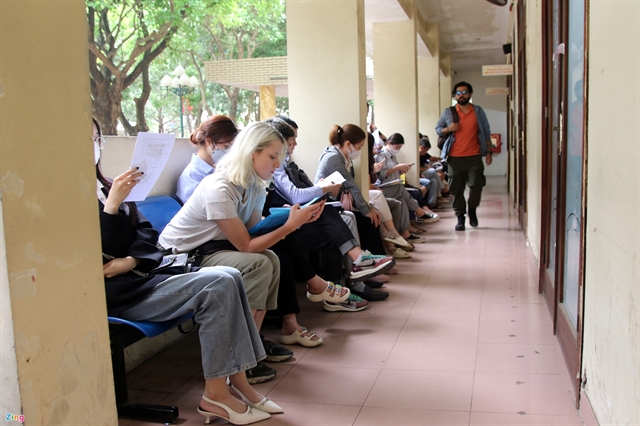.jfif) Opinion
Opinion

 |
| Locals and foreigners wait to submit applications for the criminal record check. — Photo zingnews.vn |
Recent reports in local media have highlighted the frustration of Hà Nội residents as they queued for hours to get a number and wait for days to actually lodge their applications for criminal record certificates to the city's Department of Justice.
In an interview with the online newspaper Dân Trí (Intellectuals), Hoàng Quốc Hùng, director of the National Criminal Record Centre, said the poor organisation of work was the main cause of the congestion and that apologies should be made to the people for the service delay. He also talks about the application of technology in the process.
Many people who need a criminal record certificate have had to queue up to get a number before submitting their documents as early as 4am at Hà Nội’s Department of Justice. What are the reasons leading to this?
There are several reasons for people having to queue up and waiting for days to submit their documents for a judicial record certificate at the department.
The major reason is the organisation of work at the justice department. Instead of ensuring a smooth flow of work, they have only two booths processing the documents, creating a bottleneck, so it’s no wonder people have to wait.
The number of applications in Hà Nội is not the highest. Nghệ An and HCM City receive more applications than Hà Nội, but there is no congestion, and they have resolved the issue very well.
This is also due to the awareness of the leadership there. Staff may think that this is the responsibility of the judicial record division rather than seeing it as a common political task of the whole department. The coordination mechanism is not smooth and clear.
Within the Department of Justice, there has been no guidance from top leaders. The Director of the Department should have created a mechanism to send more personnel to carry out this task.
After receiving guidance from the Ministry of Justice and the Hà Nội People's Committee, I was informed that no one has to queue up anymore, as of late afternoon Friday.
 |
| Director of the National Criminal Record Centre Hoàng Quốc Hùng. — Photo dantri.com.vn |
You once said at a press conference of the Ministry of Justice that if there were delays in handling procedures and issuing judicial record certificates, then apologies should be made to the people. Should the Director of the Hà Nội’s Department of Justice publicly apologise to the people?
Apologies should be made to the people. At the National Criminal Record Centre, in case one has not had their procedures processed promptly, we would make an apology to them.
Only then will the people be satisfied with the service. That is the administrative system for the people, otherwise, it’s just a formality.
Given the congestion in administrative procedures in Hà Nội, has the National Criminal Record Centre requested other localities to review their procedures?
So far, it has only happened in Hà Nội. However, we will also review other localities, and if there are any congestion issues, like in Hà Nội, we will resolve the problems immediately. The Director of the National Judicial Record Centre will come to handle it himself.
We are ready to send officials to support wherever there is congestion because the ultimate goal is to serve the people.
How has the application of information technology in issuing judicial record certificates been implemented?
The National Judicial Record Centre has implemented the software for many years. It is a smooth coordination between the departments of Justice, the National Judicial Record Centre, the Bureau of Professional Records (V06, Ministry of Public Security), and the Police Agency for Administrative Management of Social Order (PC06) in localities. Thanks to this, we have comprehensive, complete and timely information.
When receiving applications and requests from people, the system will classify them (into smaller branches) and search the database together. The results will be integrated and sent to the centre.
The information will be compared with data stored at the centre and further verified at the Central Military Court if necessary.
After having complete information, the centre will issue the document and send it to the Department of Justice online.
The process is conducted mostly by the National Judicial Record Centre which is responsible for the results. The Department of Justice receives the results and prints and signs the documents.
On average, we process about 2,000-2,500 applications per day and up to 3,000 at peak times. All are processed through automatic software.
Previously, each officer could handle only 5-10 records per day, but now we can process much faster. The deadline for delivering results is 15 days, but usually, we can provide results in five days. Information is accurate, and we receive very few complaints.
Regarding complex cases that are involved in missing information or lost records, how have these cases been processed?
These cases account for only about 0.5 per cent. They include cases where records are lost or not recorded in the police database or cases where there are changes in administrative boundaries.
For these cases, we have to search through multiple sources and verify information from investigative agencies, prosecution offices, and enforcement agencies to determine whether someone has had their criminal record cleared.
In the past, many officials responsible for handling these records were afraid of taking responsibility and did not know how to respond to such cases. However, with the responsibility mandated by law, I signed Document 558 to solve this issue for localities.
Even in cases where the record is unknown, we still have to issue documents for the people.
In principle, we follow the Constitution, which states that a person is only considered guilty if there is a legally effective criminal judgment.
According to the Law on Judicial Records, a person is only considered to have a criminal record if there is a legally effective criminal judgment or decision.
Based on the Constitution and the Law on Judicial Records, we are still able to respond to the people in complex cases.
We have proposed amending Article 25 of Decree 111/2020, which provides detailed regulations and guidance on the implementation of certain provisions of the Law on Judicial Records.
In cases where information about criminal records is not received within the deadline, we still have to respond, stating that there is no criminal record.
At the same time, we will apply the technology and digitisation to search and provide accurate information to people quickly. This decree will be issued by the Government soon. — VNS
The criminal record certificate is currently issued by the Department of Justice and used for:- Verifying whether an individual has a criminal record, or whether they are prohibited from certain activities or not.- Recording the expungement of criminal records, creating opportunities for individuals who have been convicted of reintegrate into the community.- Supporting criminal proceedings and criminal justice statistics activities.- Supporting personnel management, business registration, establishment, and management of enterprises, and cooperatives.